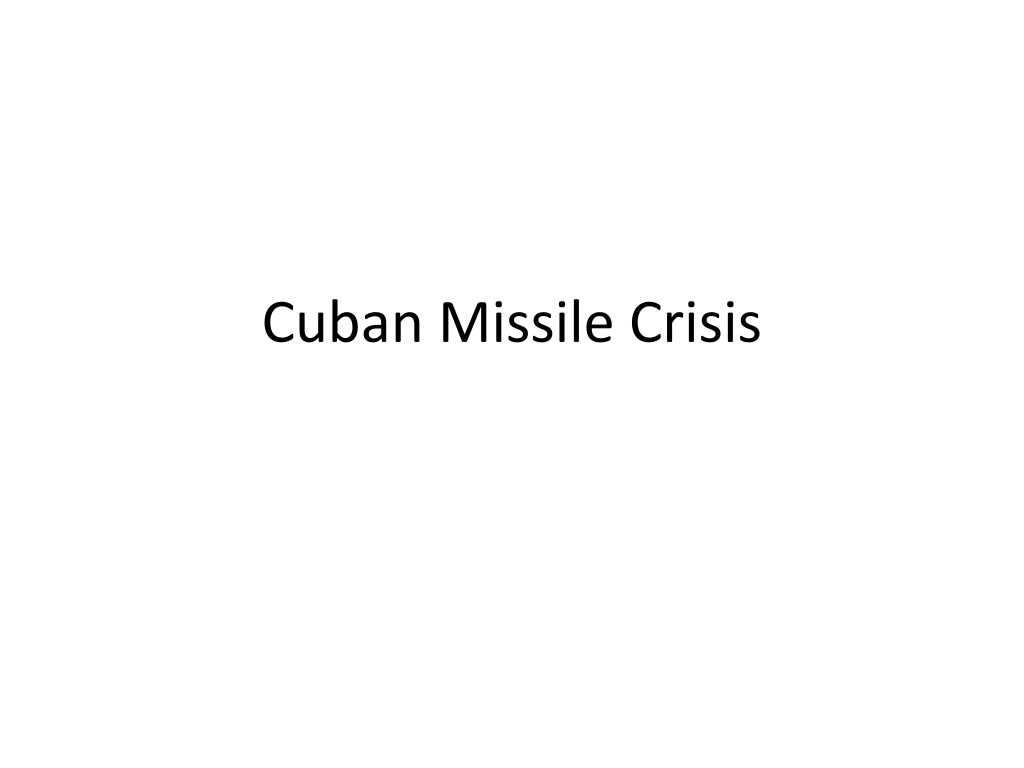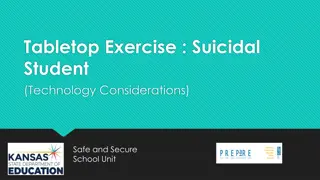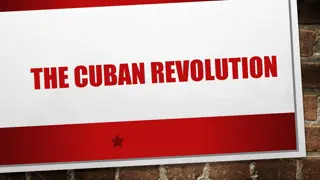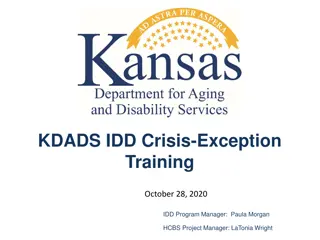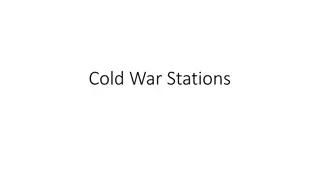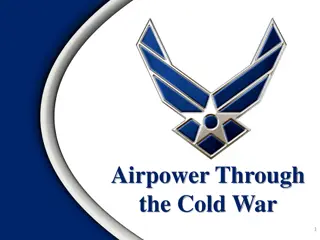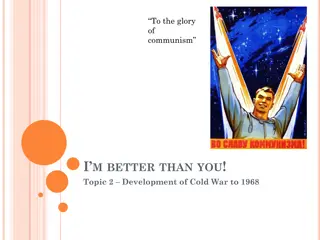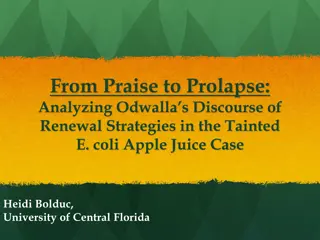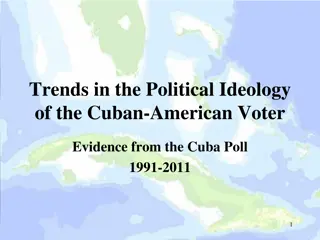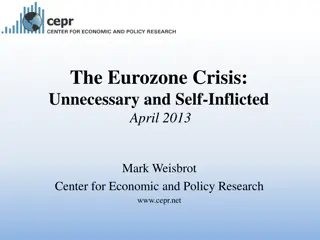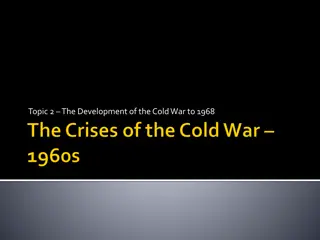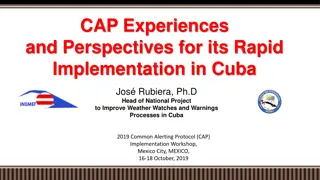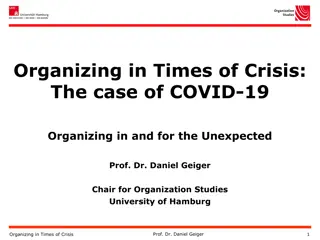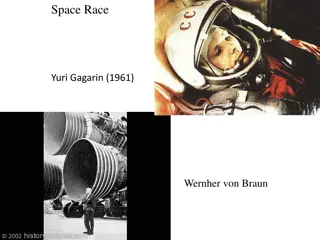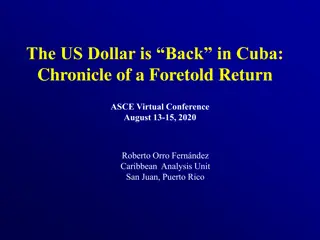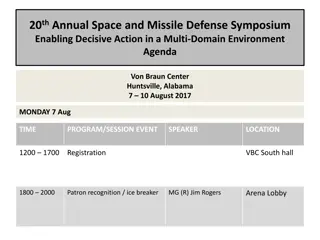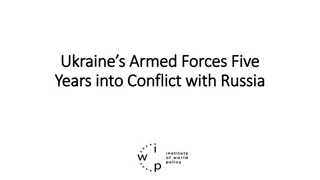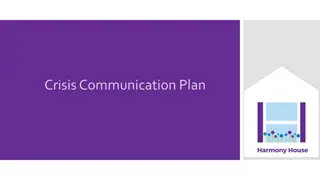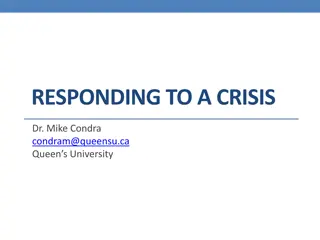Understanding the Cuban Missile Crisis in Historical Context
Explore various aspects of the Cuban Missile Crisis, including the political cartoons, Kennedy's response, USA's reactions to the Cuban Revolution, USSR's involvement in Cuba, and the outcomes of the crisis. Learn about the key players, their decisions, and the impact on Cuba, USA, and the USSR.
Download Presentation

Please find below an Image/Link to download the presentation.
The content on the website is provided AS IS for your information and personal use only. It may not be sold, licensed, or shared on other websites without obtaining consent from the author. Download presentation by click this link. If you encounter any issues during the download, it is possible that the publisher has removed the file from their server.
E N D
Presentation Transcript
WARNING! Remember these answers are not full answers but are just suggestions of points that you could include!
What is the message of this cartoon? A cartoon published in a British newspaper on 24 October 1962. Kennedy and Khrushchev are shown as gunslingers. Castro is on the donkey.
M- The main message is that the good, clean cut guy Kennedy is standing up to the threat of the scoundrels who are riding into town. C- Kennedy is shown standing (up to the threat) whilst Castro is shown as a lesser threat by being shown on a donkey and dropping his gun. Khrushchev is larger and therefore more of a threat and is shown behind (backing / supporting) Castro. C-The cartoon is in the context of Khrushchev supporting Castro and having put weapons on Cuba. The US was frightened as Cuba was very close to America and they felt threatened. Kennedy had to make decisions to avoid nuclear war and he did this by stopping the USSR.
8 mark Explain why Kennedy could claim victory in the Cuban Missile Crisis.
4 mark Describe the USA s reaction to the Cuban Revolution. Describe the USA s response to Castro s seizure of power in Cuba. Describe how Cuba changed under Castro.
6 mark Explain why the failure of the Bay of Pigs invasion caused problems for the USA. Explain why the Soviet Union became involved in Cuba. Explain why Khrushchev placed missiles in Cuba. Explain Kennedy s options after missile sites were discovered in Cuba.
10 mark The outcomes of the Cuban Missile Crisis were equally successful for: (i) the USA; (ii) the USSR; (iii) Cuba. How far do you agree with this statement? The USA was more responsible for causing the Cuban Missile Crisis than the USSR. How far do you agree with this statement? Kennedy handled the Cuban Missile Crisis better than Khrushchev did. How far do you agree with this statement? The Cuban Missile Crisis was a victory for the Soviet Union. How far do you agree with this statement?
Explain why Kennedy could claim victory in the Cuban Missile Crisis. (8)
Explain why Kennedy could claim victory in the Cuban Missile Crisis. (8) There was no war. Kennedy s reputation increased. He had stood up to Khrushchev. He helped start the thaw of Cold War relations Pick 3 and EXPLAIN using PEE
Kennedy came out of the crisis with a greatly improved reputation in his own country and throughout the West having stood up to Khrushchev and made him back down. Kennedy removed the view of him being a weak / inexperienced President by standing up to Khrushchev who had thought he was a push-over. Kennedy decided to follow a policy of containment by introducing a blockade and persuading Khrushchev to turn his ships around. The hardliners in his government and some of his advisers wanted him to turn back Communism. This was a dangerous, high risk strategy which could have resulted in nuclear war.
Describe the USAs reaction to the Cuban Revolution. (4)
Describe the USAs reaction to the Cuban Revolution. (4) The USA was concerned over the establishment of friendly relations with the Soviet Union. In July 1960 the US stopped buying Cuban sugar. Later in 1960 the US banned all trade with Cuba. In January 1961 the US broke off all diplomatic relations with Cuba. The US was trying to starve Castro into submission. The CIA planned to overthrow Castro. In April 1961, the Bay of Pigs invasion took place. Stopped economic aid.
Describe the USAs response to Castro s seizure of power in Cuba. (4)
Describe the USAs response to Castro s seizure of power in Cuba. (4) The relationship became frosty but without direct confrontation. In January 1961 the USA broke of diplomatic relations. In April 1961 The US supported a direct invasion the Bay of Pigs. To starve Castro into submission. The US banned the buying of sugar and then banned all trade with Cuba
Describe how Cuba changed under Castro. (4)
Describe how Cuba changed under Castro. (4) He replaced Batista. He removed political opponents who were a threat. He won over the majority of Cubans. He took over American businesses. In 1960 he allied Cuba with the USSR. Diplomatic relations with the USA were broken off in January 1961. Castro sold his sugar to the USSR rather than the USA.
Explain why the failure of the Bay of Pigs invasion caused problems for the USA. (6)
Explain why the failure of the Bay of Pigs invasion caused problems for the USA. (6) The fiasco of the Bay of Pigs further strengthened Castro s position in Cuba and suggested to the USSR that Kennedy was weak. It made Castro and Khrushchev very suspicious of US policy. The half-hearted invasion suggested to the Soviet Union that despite its opposition to Communism in Cuba, the USA was unwilling to get directly involved in Cuba. The Soviet leader was scornful of Kennedy s pathetic attempt to oust Communism from Cuba. Under the guise of protecting Cuba, significant quantities of Soviet arms flooded into Cuba making Cuba the best equipped army in Latin America. The US watched this with great alarm. This alarm was increased significantly when nuclear weapons were sent.
Explain why the Soviet Union became involved in Cuba. (6)
Explain why the Soviet Union became involved in Cuba. (6) Khrushchev wanted to bargain with the USA. If he had missiles in Cuba he could agree to remove them if the USA removed their missiles from, Turkey. In the context of the Cold War, he was trying to see how strong the USA really was and to test the new President. Khrushchev was anxious to defend Cuba. It was the only Communist state in the Western hemisphere, and had willingly become Communist. In addition Cuba was in the US s backyard . It was ideal to try to encourage Communist development in South America.
Explain why Khrushchev placed missiles in Cuba. (6)
Explain why Khrushchev placed missiles in Cuba. (6) To bargain with the USA. To test the will of Kennedy. To gain the upper hand in the arms race. To defend Cuba. To extend communism. Pick 3 EXPLAINED using PEE
Explain Kennedys options after missile sites were discovered in Cuba. (6)
Explain Kennedys options after missile sites were discovered in Cuba. (6) He had the option to do nothing as the USA was the greater power. To begin an immediate air attack to destroy the missile bases. To carry-out an invasion of Cuba by air and sea. To put on diplomatic pressure such as UN. To introduce a blockade to prevent further military supplies coming into Cuba. Pick 3 EXPLAINED using PEE
Kennedy could enforce a blockade which would prevent further military supplies reaching Cuba. This would show the USA was serious, but it would not be an act of war. It would put the burden on Khrushchev as to what to do next. This would not solve the main problem the missiles were already on Cuba and could be used within a week.
The outcomes of the Cuban Missile Crisis were equally successful for: (i) the USA; (ii) the USSR; (iii) Cuba. How far do you agree with this statement? Explain your answer referring only to (i), (ii) and (iii). (10)
The US foreign policy of containment was not successful because Cuba remained a Communist state despite the removal of missiles, the Bay of Pigs incident and the withdrawal of trade. The price the USA had to pay for the removal of Soviet missiles was the secret removal of US missiles in Turkey, thus weakening US containment policy. Kennedy could claim that he had stood up to Khrushchev and his decisive action removed the threat of a nuclear base in Cuba. In the USSR, the fact that Khrushchev had been forced to back down was quickly forgotten and instead his role of responsible peacemaker, willing to make the first move to compromise, was highlighted. The crisis damaged Khrushchev s prestige, despite the fact he claimed the crisis was a victory for the USSR. Some leading Soviet politicians were angry that their country had been forced to back down. They played a significant part in Khrushchev s dismissal in 1964. Cuba considered itself a strong ally of the USSR and could depend on it for protection and considerable aid. Cuba remained an important base for Communist supporters. Castro kept control of the American companies and other economic resources he had nationalised.
The USA was more responsible for causing the Cuban Missile Crisis than the USSR. How far do you agree with this statement? Explain your answer. (10)
The USA was concerned about the coming to power of Castro and tried to remove him with the Bay of Pigs operation. This was a total failure and Kennedy was humiliated. It resulted in Castro moving even closer to the USSR who began to place missiles on Cuba. The Berlin Crisis and the building of the Wall in 1961 greatly increased the tension between the superpowers. As Kennedy was seen to be weak by not taking action in Berlin, Khrushchev tested him further by placing missiles as close as possible to the USA to increase the Communist sphere of influence. This was one of the reasons for the crisis.
Kennedy handled the Cuban Missile Crisis better than Khrushchev did. How far do you agree with this statement? (10)
Kennedy handled the Cuban Missile Crisis better than Khrushchev did. How far do you agree with this statement? (10) Kennedy came out of the crisis with a greatly improved reputation in his own country and throughout the West. He had stood up to Khrushchev and forced him to back down. Kennedy also stood up to the hardliners in his own government. Some had wanted the USA to invade Cuba but Kennedy realised this was not worth the high risk. Instead he persuaded Khrushchev to withdraw and not cross the blockade. Kennedy did have to remove the US missiles from Turkey. However, Khrushchev had to agree to keep this secret so as not to gain publicity. There was no question that keeping Cuba safe from America action was a major achievement for the Soviets. Cuba was a valuable ally and proved a useful base to use to support Communists in South America. In public, Khrushchev was able to highlight his role as a responsible peacemaker, willing to make his first move towards compromise. The crisis damaged Khrushchev s prestige; despite the fact he claimed the crisis was a victory for the Soviet Union. Some leading Soviet politicians were angry that their country had been forced to back down. They played a significant part in Khrushchev s dismissal in 1964.
The Cuban Missile Crisis was a victory for the Soviet Union. How far do you agree with this statement? (10)
The Cuban Missile Crisis was a victory for the Soviet Union. How far do you agree with this statement? (10) In public Khrushchev was able to highlight his role as a responsible peacemaker, willing to make the first move towards compromise by writing letters and withdrawing missiles. Keeping Cuba safe from America was a major achievement for the Soviets. Cuba was a valuable ally and a useful base to support Communists in South America. The US had to accept that Castro s Cuba would remain a Communist state in America s backyard. The crisis exposed the USA to criticism with arguments about the USA being unreasonable in having missiles in Turkey and then objecting to Soviet Missiles in Cuba. The crisis damaged Khrushchev s credibility, despite the fact he claimed the crisis was a victory for the Soviet Union. Some leading Soviet politicians were angry that their country had been forced to back down. This played a significant part in Khrushchev s dismissal in 1964. Kennedy came out of the crisis with a greatly improved reputation in his own country and throughout the West. He had stood up to Khrushchev and forced him to back down. The USA agreed to withdraw its nuclear missiles from Turkey. However the withdrawal had to be kept secret so it could not be used for propaganda purposes.
The USA was more responsible for causing the Cuban Missile Crisis than the USSR. How far do you agree with this statement? (10)
The USA was more responsible for causing the Cuban Missile Crisis than the USSR. How far do you agree with this statement? (10) The USSR had made Kennedy look weak in relation to the Berlin Wall and they were pushing him further. Khrushchev sent missiles to Cuba. The USA had missiles threatening the USSR. A policy of containment was operated by the USA. The Bay of Pigs incident increased Soviet action. The USA was concerned about the coming to power of Castro and tried to remove him with the Bay of Pigs operation. This was a total failure and Kennedy was humiliated. It resulted in Castro moving even closer to the USSR who began to place missiles on Cuba. The Berlin Crisis and the building of the Wall in 1961 greatly increased the tension between the superpowers. As Kennedy was seen to be weak by not taking action in Berlin, Khrushchev tested him further by placing missiles as close as possible to the USA to increase the Communist sphere of influence. This was one of the reasons for the crisis.
